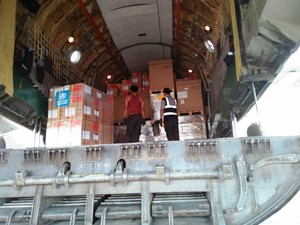 16 November 2017, Cairo, Egypt – WHO has airlifted trauma kits and medical supplies to the Islamic Republic of Iran to support the treatment of thousands people injured as a result of the recent earthquake in the Islamic Republic of Iran-Iraq border region.
16 November 2017, Cairo, Egypt – WHO has airlifted trauma kits and medical supplies to the Islamic Republic of Iran to support the treatment of thousands people injured as a result of the recent earthquake in the Islamic Republic of Iran-Iraq border region.
The supplies, enough to provide surgical care for up to 4000 trauma patients, were transported from WHO’s emergency logistical centre in Dubai to Kermanshah province in western Islamic Republic of Iran on 16 November at 10.30am local time. They were immediately delivered to hospitals and other health facilities receiving the injured.
“Additional trauma kits are available in WHO’s emergency logistical centre in Dubai and will be delivered as needed to health facilities reporting shortages. Special emphasis will also be given to identifying specific health needs as a result of current colder temperatures in affected areas,” said Dr Michel Thieren, WHO Regional Emergency Director. “While there is no direct link between earthquakes and disease outbreaks, close monitoring for cases of infectious diseases, especially waterborne diseases, is also required.”
Almost 9400 people in the Islamic Republic of Iran were injured as a result of the earthquake, including more than 1000 people hospitalized in Kermanshah province with serious injuries, and 340 more who were transferred to hospitals in neighbouring provinces, including Tehran.
The two cities of Sar Pol Zahab and Ghasr Shirin in Kermanshah province, with a total population of almost 115 000 people, are reported to have suffered considerable damage, with almost 80% of infrastructure destroyed. One main hospital in the province was forced to close, and 49 more health facilities were damaged, but remain open.
In Iraq, the earthquake was felt in the major cities of Sulaimaniyah, Halabja, Erbil and Duhok, with a total of 8 fatalities and 525 people injured. Darbandikhan in northern Sulaimaniyah was most affected, with damages to Darbandikhan hospital and Sharazoor maternity hospital.
Immediately following the earthquake, WHO’s office in Iraq deployed a medical team and three ambulances, and delivered 4 tents and emergency lifesaving supplies sufficient for 200 surgical operations, to hospitals in Sulaimaniyah governorate receiving critical cases.
WHO continues to work closely with national health authorities in the Islamic Republic of Iran and Iraq to monitor the health impact of the earthquake and respond to urgent needs.


